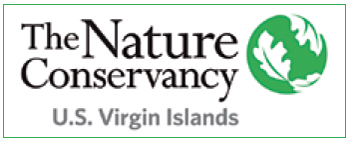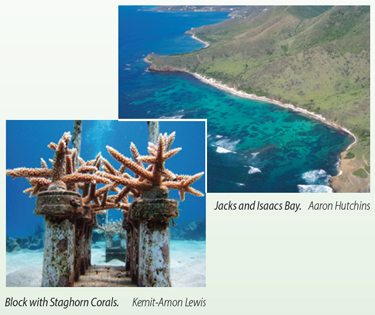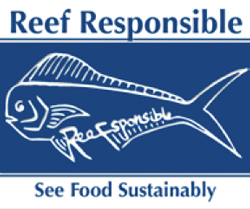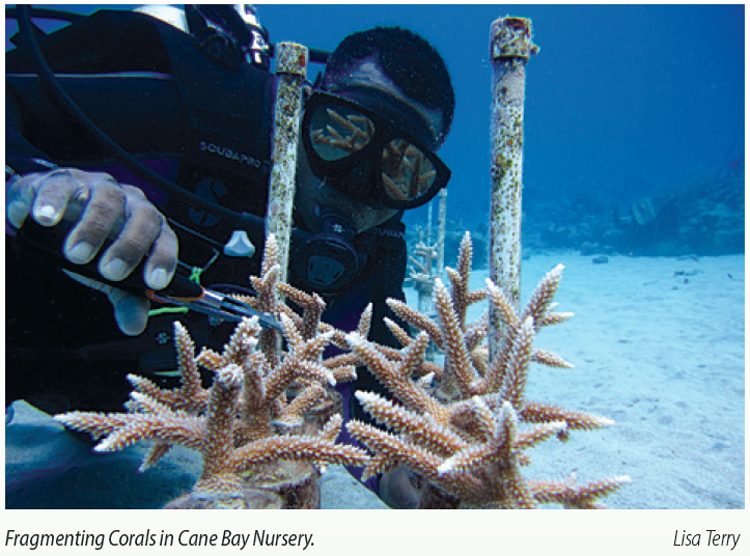 by Kemit-Amon Lewis and Lisa K. Terry
by Kemit-Amon Lewis and Lisa K. Terry
The Nature Conservancy is a leading global conservation organization with the mission of conserving the lands and waters on which all life depends. To protect the rich diversity of corals, fish, sea turtles, birds and plants inhabiting the lands and waters of the Virgin Islands, we are using every tool at our disposal. Our strategies include the establishment of marine and terrestrial protected areas, coral reef restoration, species monitoring and protection, and promoting sustainable seafood.
Reef Resilience and Restoration
Coral reefs provide essential habitat for many commercially and recreationally important species of fish and other creatures. In addition to their importance as habitat, these shallow water corals provide snorkeling and diving opportunities that support tourism, the largest economic driver in the Caribbean.
In the last three decades, competing human demands on coral reef ecosystems, coupled with the impact of increasing water temperatures, bleaching, disease, devastating hurricanes, and algal overgrowth, have damaged reefs in the Virgin Islands to the point that they are now struggling to survive. Scientists estimate that living coral cover throughout the Caribbean Sea has decreased by 50-80% since the late 1970s.
Alarmingly, two of the most important reef building corals, Staghorn coral and Elkhorn coral, have declined by 90-95%, landing them both on the IUCN Red List as critically endangered and gaining protection under the US Endangered Species Act. The Nature Conservancy is working to replenish these corals by creating underwater coral nurseries that are tended to by trained Conservancy technicians and volunteers. These nurseries provide secure, stable settings where small coral fragments can grow and thrive. When healthy and of adequate size, the nursery-raised coral fragments are transplanted onto the damaged reefs where they will increase natural production and genetic diversity. Keep your eyes open when snorkeling at Cane Bay for our nursery demonstration site and some transplanted corals, about 200 yards from the beach.
 Protecting the Lands and Turtles
Protecting the Lands and Turtles
The Conservancy manages over 550 acres in the US Virgin Islands – including the Jack & Isaac’s Bay Preserve in St. Croix, which is comprised of fragile ecosystems of rolling hills, steep valleys and beautiful beaches. Not only is Jack and Isaac’s Bay home to the largest nesting population of green sea turtles on the island, its waters also harbor more than 400 species of fish as well as several varieties of coral, starfish, and conch.
Sea turtles nest on St. Croix year round, with peak activity from July to September. Threats from loss of nesting habitat, degradation of foraging habitat, invasive species, poaching, pollution and fishery interactions continue to devastate sea turtle populations. Some experts estimate that only one in 1,000 sea turtle hatchlings will survive into adulthood.
On St. Croix, signs of sea turtle recovery are attributed to targeted public and private interventions. In 1999, the Conservancy created the Jack & Isaac’s Bay Preserve to protect sea turtles after a survey determined that nearly one-third of the nests on these beaches, and the adjacent East End Beach in East End Marine Park, were being poached. As a result of the Conservancy’s sea turtle monitoring and protection program, poaching was reduced to less than one percent due to patrols, monitoring and research activities on the beaches during nesting season. Today, poaching is almost unheard of on these actively monitored nesting beaches.
 Encouraging Sustainable Seafood
Encouraging Sustainable Seafood
The Reef Responsible Sustainable Seafood Initiative was created, with key partners in the U.S. Virgin Islands, to promote local, sustainably harvested fish and other seafood. The Conservancy has already trained sixteen restaurants that are now branded as Reef Responsible, signaling to consumers that their seafood is in-season and sustainably harvested. By working directly with commercial fishers The Conservancy is helping them understand why species like conch, grouper and snapper have closed seasons in order to protect their reproductive cycles and hence their sustainability. The goal is to also train fishers to be Reef Responsible. Support, interest and demand for the initiative is strong, and the Conservancy is currently planning to expand the program to neighboring islands in the Caribbean. Visit www.reefconnect.org for a full list of participating restaurants.
To learn more about the state of the reefs in the US Virgin Islands and what you can do to protect them, including volunteer opportunities, visit www.reefconnect.org.
Contact Information:
Kemit-Amon Lewis: [email protected]
Lisa Kirkley Terry: [email protected]
3052 Estate Little Princess, Christiansted VI, 00820
Tel. (340) 718-5575
www.reefconnect.org

